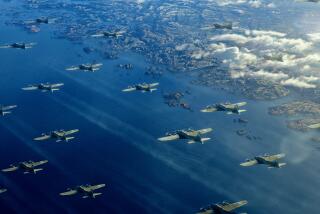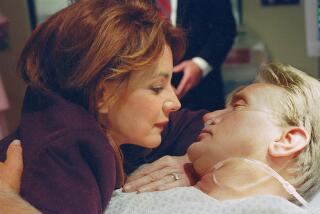The Times’ 1986 review of ‘Top Gun’ found it full of high-tech flyboys
“Top Gun” (citywide) is a male bonding adventure movie that’s both exciting and disturbing, mind-boggling and vacuous.
Allegedly based on the Navy’s crack fighter pilot program at San Diego’s Miramar Naval Base, it sucks us into a high-tech world of multimillion-dollar aircraft and hell-for-leather fliers--of huge carriers bobbing on gray oceanic deeps; jets streaking through vast skies piled high with clouds; heat-seeking missiles roaring toward enemy aircraft; sudden death in a wilderness of sky, water and radar screens.
You can’t help being impressed by this world--an eye-filling blowout zooming at you in Panavision and Dolby. Producers Don Simpson and Jerry Bruckheimer (“Flashdance,” “Beverly Hills Cop”) seem frankly infatuated with a vision of the Miramar trainees as rock ‘n’ roll air cowboys. The movie shows the flyboys (an appropriate word here) either in class, the shower room, the local bars or that vast playground of the air--and in the last two, they’re drowned in pounding techno-pop.
These are pilots you might see in a Calvin Klein ad; and Kelly McGillis--as Charlie, an astrophysicist who lectures on enemy capabilities--is the one who’d be wearing the Calvins. (McGillis gives a good performance--all husky voice, smoky eyes and Bacall-ish invitation--but she seems as out of place as Wernher von Braun might be, playing the Marlboro Man.)
The movie--directed by one-time commercial ace Tony Scott--is fixated on that mythical goal: “being the best.” The trainees are a fraternity of studs--with nicknames like Iceman, Sundown and Slider--butting heads for top notch in the outfit, and the script links sexual potency with their prowess as pilots. (The airfields are thick with phallic symbols, and one trainee gets aroused whenever he’s airborne.)
Supposedly, “Top Gun” was heavily researched: The credits list enough naval advisers to start a small sea battle, headed by instructor Pete (Viper) Pettigrew. How then--unless the producers demanded it--did scenarists Jim Cash and Jack Epps Jr. come up with this easy rehash of “Ceiling Zero,” “Captains of the Clouds” and the movies of Howard Hawks, William Wellman, Jimmy Cagney and Pat O’Brien? (All of whom did it better.)
The split between the movie’s gaudy trappings and its chestnut plot are immense. Sometimes, the camera work and editing are amazing: shots of F-14 Tomcats, F-5 Tigers and A-4 Skyhawks skyward, roaring, shaking you with speed.
Then, for about the hundredth time, we’re shown the egotistical hotshot pilot (Tom Cruise’s Maverick), who cracks wise, takes chances and buzzes the air tower. We get our old friend, the tough but kindly commander (who flew with Maverick’s father and knows his secrets); his comically affable buddy Goose; the pretty secretary who won’t give Maverick a tumble; the pilots who don’t think he’s a team player.
There’s an accident crippling his moxie and once again, we’re asked to wonder: Will this guy crumble in the crunch? (Is there any doubt in your mind? Are you in suspense about this?) The one new touch in “Top Gun” is that the secretary has become an astrophysicist in designer jeans.
Measuring this movie against its model--Hawks’ air films--you can see the difference between a great director making his movies breathe, and a superproduction that depends on action and hardware. “Top Gun” is an empty-headed technological marvel. The actors--especially Anthony Edwards, Val Kilmer and Meg Ryan--are good, but they only connect as archetypes. The emotion heats up only when the planes are flying. (If Howard Hughes were alive, he might watch “Top Gun” more times than “Ice Station Zebra.”)
There’s another problem here: The Enemy. “Top Gun” is careful never to name the foreign fliers who raise havoc at the close--giving the Miramar grads a chance to show their stuff and get a real kill.
For all we’re told, these unfriendly pilots might be Nazis, pirates, renegade Apaches or great white sharks--though, since they’re flying MIGs, one guesses they’re Libyans or Soviets. A toddler wandering into this movie (PG despite some steamy sex scenes), might come away thinking America was actually at war now--and, if he knew music, he might think the opposing generals were Giorgio Moroder and the Righteous Brothers.
That’s the overall impression left by “Top Gun”: Disco War. Like disco, it evaporates from your mind minutes after you leave. Even though it’s an irresponsible movie (but one that has “hit” written all over it), it’s hard to get offended. The deepest impulses behind “Top Gun” are not political but sexual: You can tell by the number of scenes set in the shower.
Meanwhile, one hopes that the scant handful among “Top Gun’s” male audience who have professions worthy of manhood--like Ronald Reagan, Viper Pettigrew, Dom DeLuise or Boy George-- won’t let it go to their heads.
More to Read
Only good movies
Get the Indie Focus newsletter, Mark Olsen's weekly guide to the world of cinema.
You may occasionally receive promotional content from the Los Angeles Times.










